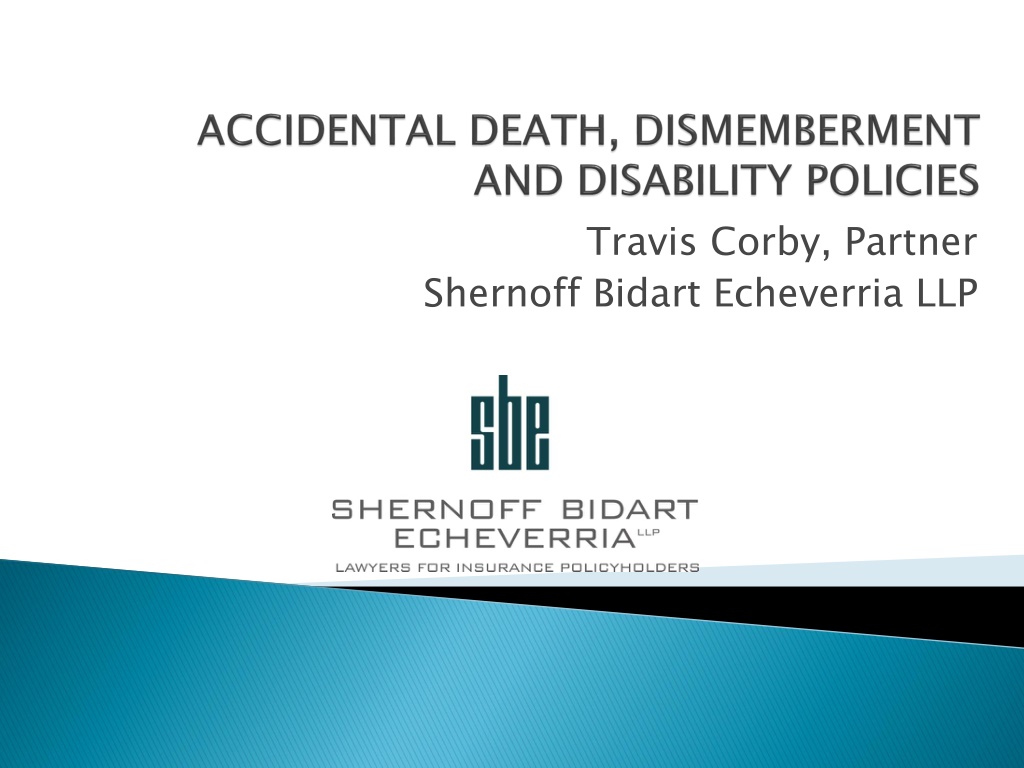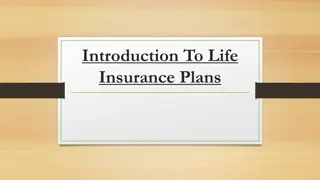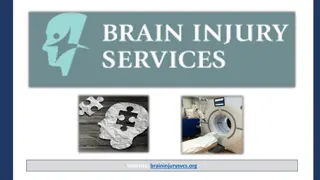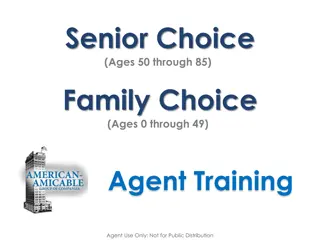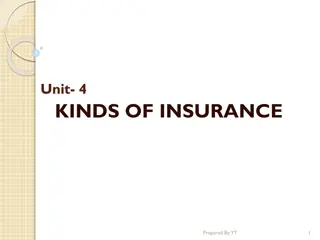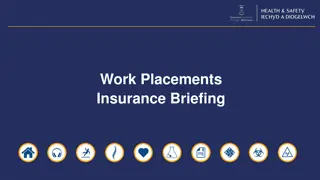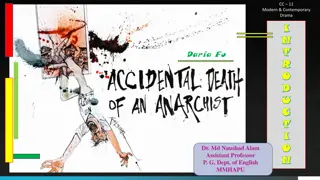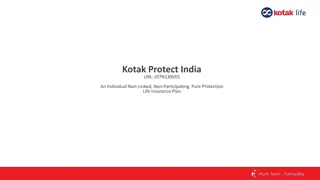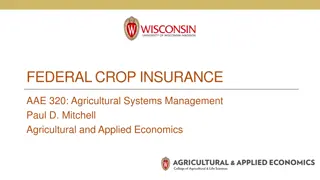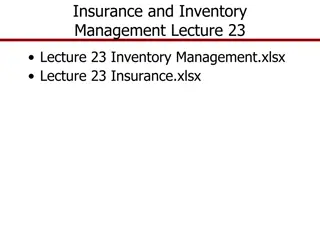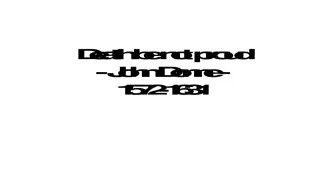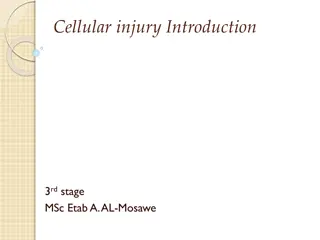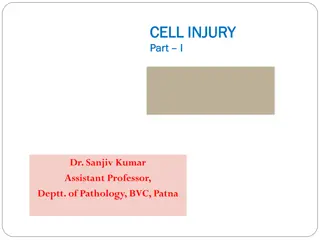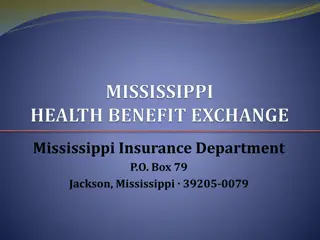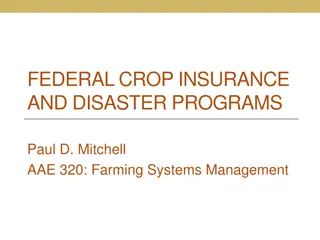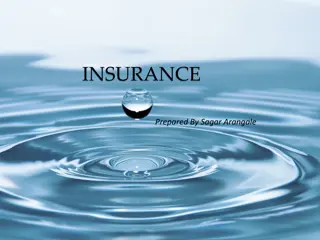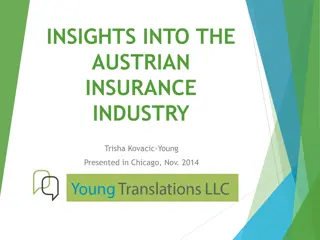Understanding Accidental Death and Injury Provisions in Insurance Policies
Accidental death and injury provisions in insurance policies cover unexpected events such as accidents leading to death, dismemberment, disability, or hospitalization. These provisions define accidents as sudden, unforeseen occurrences with external causes, not related to natural processes. The terms "accident" and "accidental" are interpreted based on common understanding and usage, requiring that the insured's death was unintended and not anticipated by the insured. Common policy definitions and exclusions clarify coverage for injuries caused directly by accidents, while excluding coverage for losses due to diseases or pre-existing conditions.
Download Presentation

Please find below an Image/Link to download the presentation.
The content on the website is provided AS IS for your information and personal use only. It may not be sold, licensed, or shared on other websites without obtaining consent from the author. Download presentation by click this link. If you encounter any issues during the download, it is possible that the publisher has removed the file from their server.
E N D
Presentation Transcript
Travis Corby, Partner Shernoff Bidart Echeverria LLP
Accidental Death accident. Double (or Increased) Indemnity Provisions in a Standard Life Policy an insured dies as a result of an accident. Accidental Dismemberment becomes dismembered as a result of an accident. (E.g. loss of an eye, hand, arm, leg, paraplegia, blindness, ect.) Accidental Disability is rendered Totally Disabled as a result of an accident (most often pays for a longer period of time if Totally Disabled as a result of an accident versus sickness). Accidental Indemnity monthly) if insured is hospitalized as a result of an accident. Accidental Death Pays if the insured dies as a result of an Double (or Increased) Indemnity Provisions in a Standard Life Policy Pays double the benefits (or a higher benefit if Accidental Dismemberment Pay a benefit if an insured Accidental Disability Pays disability benefits if an insured Accidental Indemnity Pays indemnity benefits (usually
Accident is not defined by statute and is usually not defined in an insurance policy. Examples of Policy Definition of Accident An occurrence which is unexpected or unforeseen, either as to its cause or as to its result.
The words accident and accidental must be construed according to ordinary understanding and common usage. (Olson v. American Bankers Ins. Co. (1994) 30 Cal.App.4th816, 826.) Something that happens suddenly and unexpectedly and involves some form of external events and forces as opposed to purely natural processes. (Khatchatrian v. Continental Cas. Co (9thCir. 2003) 332 F.3d 1227, 1229.)
Accidental death requires only that the insureds death was not designed or anticipated by the insured. An unintended and undesigned result even if caused by voluntary acts. Accidental means requires an unintended death and that the act or means which produced the death was unexpected or unforeseen. Key question: was the insured s voluntary act itself such that its common, natural, or probable consequence would have been to visit injury or death upon the insured. If not, then the death may be considered to have occurred through accidental means. -Weil v. Federal Kemper Life Assurance Company (1994) 7 Cal.4th125, 134.)
Common Policy Definitions: Injury: Bodily damage or harm which is caused directly by an accident and independent of all other causes. Injury: Bodily injury that results directly and independently of all other causes Common Policy Exclusions for death due to disease, bodily or mental infirmity No benefits will be paid for any loss or covered injury that is due to any disease, sickness, bodily or mental illness, or complication resulting from medical treatment, surgery . Common Policy Definitions: Common Policy Exclusions for death due to disease, bodily or mental infirmity
Proximate cause is the determining factor even where a pre-existing injury or disease contributes to a death. The presence of preexisting disease or infirmity will not relieve the insurer from liability if an accident is the proximate cause of the insured s death, and a recovery may be had on the policy even though a diseased or infirm condition appears to contribute to cause the death, or if the accident set in progress the chain of events leading directly to death or if it is the prime or moving cause. -Brooks v. Metropolitan Life Insurance Company (1945) 27 Cal.2d 305, 309-310.)
Coverage will also be upheld where an accident either triggered or sets in progress a chain of events or is the prime or moving cause. -DeBruyn v. Superior Court (2008) 158 Cal.App.4th 1213, 1223.)
Mariscal v. Old Republic Life Ins. Co (1996) 42 Cal.App.4th1617, 1625-1626 Insured was in a car accident and sustained head injuries. Patient also had a history of heart disease. He died in the hospital from heat failure. Cardiopulmonary arrest was listed as the primary cause of death on death certificate. Court concluded that: it did not matter that he ultimately died of heart failure so long as the heart failure resulted from the accident. There is substantial evidence that the prime event which set in progress the chain of events leading to Mariscal s death was the accident.
McMackin v. Great American Reserve Insurance Company (1971) 22 Cal.App.3d 428, 439. Insured had a formidable medical history of spinal injuries prior to 1996. In 1996 insured then injured his back while reaching up to move some boxes from a closet. The court found that even though the insured may have been suffering from preexisting degenerative arthritis of the spine, that did not bar recovery under his accidental disability policy where his total disability was found to be proximately caused by his 1996 accident. There is no reason to argue that the Brooks rule should only apply to the facts of that case, to wit, a claim for death benefits; whether an accident result in total disability or death, the rationale is equally convincing.
Disability: Totally Disabled within 365 days of the accident. Disability: The insured must be rendered AD&D occur within 1 year of the date of the accident causing the injury. AD&D: : The death or dismemberment must
If an accident begins the process that leads to a covered disability or death, but it takes longer than the time period set out in the policy for the condition to manifest, then the condition will be found to relate back to the date of the accident. -Wilden v. Washington National Insurance Company (1976) 18 Cal.3d 631, 635.
The onset of disability relates back to the time of the accident whenever the disability arises directly from the accident and within such time as the process of nature consumes in bringing the person affected to a state of total disability. The purpose of this rule is to prevent insurers from enforcing arbitrary limitations on coverage. -Willden v. Washington National Insurance Company (1976) 18 Cal.3d 631, 635. - Schilk v. Benefit Trust Life Insurance Company (1969) 273 Cal.App.2d 302, 307.)
We find that an ambiguity does exist. In other words, the subject provision could mean, strictly, severance of the entire hand at the joint or wrist, or where amputation commences at the wrist joint, enough loss of the and so as to render it useless. -Crawford v. Lloyds London (1969) 275 Cal.App.2d 524.
Insurance companies violating California standards as a matter of company practice. An insurance company s use of an unlawful standard has been found to warrant a punitive damage finding. (Moore v. American United Life Insurance Company (1984) 150 Cal.App.3d 610. Without a doubt, the discovery of names, addresses and files of [the insurer s] other claimants is relevant to establish whether an insurer s conduct was all part of a conscious course of conduct, firmly grounded in established company policy. (Colonial Life & Accident Ins. V. Superior Court (1982) 31 Cal.3d 785, 792).
Questions? Travis Corby, Partner Shernoff Bidart Echeverria Bentley LLP (310) 246-0503 tcorby@shernoff.com
